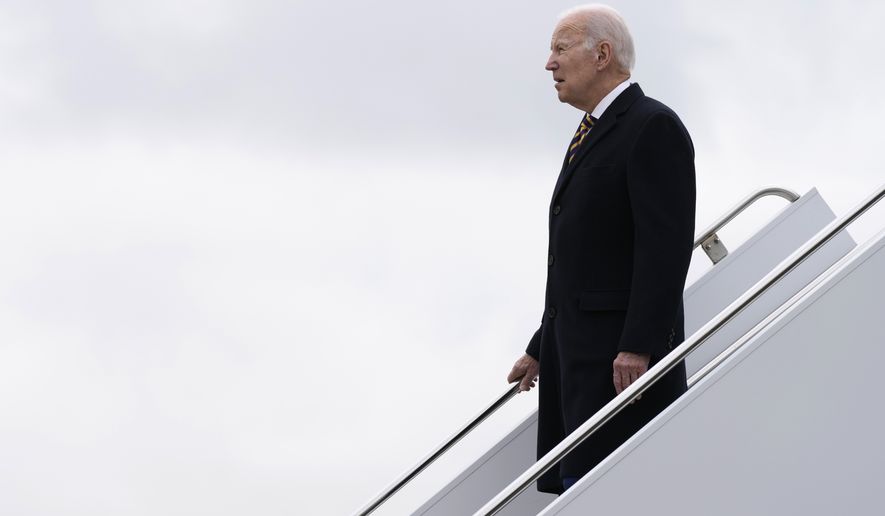President Biden has decided the coronavirus emergency will be over in early May — which is a problem for his lawyers, who are about to go to the Supreme Court and argue that the pandemic gives him the legal leeway to forgive student debt.
It also could cause trouble for Mr. Biden’s legal arguments over vaccine and masking policies, which are likewise winding their way through the courts.
Ending the health emergency also could inflame the situation at the border, where a larger tide of illegal immigration has been held back by a pandemic border expulsion policy.
The White House announced the looming end of the COVID-19 emergency in a statement of policy on Monday. The Office of Management and Budget said both the national emergency and the public health emergency will expire May 11.
Officials said they wanted to give plenty of lead time for state and local governments to adjust their policies that may be tied to the national emergency.
But legal experts said the Biden administration will have to sort out what the end means for its agenda.
“The report is likely to further confuse courts, including the Supreme Court, which has the administration claiming alternatively that the pandemic is raging or ending,” said Jonathan Turley, a law professor at George Washington University.
Mr. Biden had pointed to the pandemic as justification for his student loan forgiveness. He cited a law passed enacted this century allowing forgiveness of student loans during emergencies, and his lawyers have argued that the pandemic is just such an emergency.
His plan, revealed last summer, would cancel up to $20,000 of student debt per borrower for those who earn less than $125,000 a year — or $250,000 for married couples.
The policy has been put on hold while the courts have tested its legality. The Supreme Court has scheduled oral arguments for Feb. 28.
Critics say the administration has taken a fractious approach to the pandemic, extending some COVID-19 policies while trying to end others — all while Mr. Biden declared the pandemic “over” last September.
One major sticking point has been the Title 42 border expulsion policy, which the administration tried to end last spring, saying the health situation had improved. At the same time, however, it kept other border pandemic policies in place, including mandates on international arrivals at airports.
Mr. Turley said the mixed messaging will come back to haunt the Biden team.
“The administration is already struggling with credibility on the issue as it adopts radically different positions in public statements and pending cases. At some point, judges are likely to lose patience with this improvisational posture of the administration on the pandemic,” he said.
On Capitol Hill, Republicans said Mr. Biden seemed to be prolonging the pandemic emergency to justify some of his policies.
The House, now under GOP control, is slated to vote this week on bills to end the emergency. That’s what prompted the White House to announce it would move unilaterally to end the emergency in May.
House Republicans insisted that their bills wouldn’t have touched the Title 42 border policy, which is a decision by the Centers for Disease Control and Prevention.
The Supreme Court is slated to hear a case in March on whether states can intervene to demand Title 42 be kept in place to stop a worsening migration crisis.
Ilya Shapiro, senior fellow and director of constitutional studies at the Manhattan Institute, said the White House’s move could also affect cases over federal mask mandates for interstate travel.
“Setting an arbitrary date six weeks from now puts paid to the idea that emergency powers are tied to any actual emergency. As far as court cases go — student loan forgiveness and Title 42, and even the continuing appeal of transit mask mandates — the official ending of the emergency declaration undermines the government’s authority,” Mr. Shapiro said.
Mr. Biden seemed to acknowledge Tuesday that he’s thrown a mess on the courts.
“The COVID Emergency will end when the Supreme Court ends it. We’ve extended it to May the 15th to make sure we get everything done. That’s all,” he told reporters.
The Department of Justice declined to comment on whether the end of the emergency orders will affect its litigation.
For more information, visit The Washington Times COVID-19 resource page.
• Stephen Dinan can be reached at sdinan@washingtontimes.com.
• Alex Swoyer can be reached at aswoyer@washingtontimes.com.




Please read our comment policy before commenting.